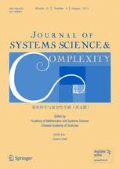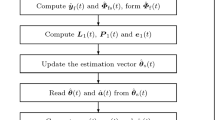Abstract
This paper is concerned with the parameter estimation of deterministic autoregressive moving average (DARMA) systems with quantization data. The estimation algorithms adopted here are the least squares (LS) and the forgetting factor LS, and the signal quantizer is of uniform, that is, with uniform quantization error. The authors analyse the properties of the LS and the forgetting factor LS, and establish the boundedness of the estimation errors and a relationship of the estimation errors with the size of quantization error, which implies that the smaller the quantization error is, the smaller the estimation error is. A numerical example is given to demonstrate theorems.
Similar content being viewed by others
References
Wang L Y, Zhang J F, and Yin G, System identification using binary sensors, IEEE Transactions on Automatic Control, 2003, 48(11): 1892–1907.
Yin G, Wang L Y, and Kan S, Tracking and identification of regime-switching systems using binary sensors, Automatica, 2009, 45(4): 944–955.
Guo J and Zhao Y L, Recursive projection algorithm on FIR system identification with binary-valued observations, Automatica, 2013, 49(11): 3396–3401.
Zhao Y L, Bi W J, and Wang T, Iterative parameter estimate with batched binary-valued observations, SCIENCE CHINA Information Sciences, 2016, 59(5): 052201.
Godoya B I, Goodwin G C, Agüero J C, et al., On identification of FIR systems having quantized output data, Automatica, 2011, 47(9): 1905–1915.
Jing L D and Zhang J F, Tracking control and parameter identification with quantized ARMAX systems, SCIENCE CHINA Information Sciences, 2019, 62(9): 199203.
Wang Y and Zhang J F, Distributed parameter identification of quantized ARMAX systems, Proceedings of the 38th Chinese Control Conference, Guangzhou, China, 2019, 1701–1706.
Guo J and Diao J D, Prediction-based event-triggered identification of quantized input FIR systems with quantized output observations, SCIENCE CHINA Information Sciences, 2020, 63(1): 112201.
Diao J D, Guo J, and Sun C Y, A compensation method for the packet loss deviation in system identification with event-triggered binary-valued observations, SCIENCE CHINA Information Sciences, 2020, 63(12): 229204.
Wang X M, Hu M, Zhao Y L, et al., Credit scoring based on the set-valued identification method, Journal of Systems Science and Complexity, 2020, 33(5): 1297–1309.
Chen H F and Guo L, Adaptive control via consistent estimation for deterministic systems, International Journal of Control, 1987, 45(6): 2183–2202.
Young P C, Recursive approaches to time series analysis, Bull. Inst. Math. Applic, 1974, 10: 209–224.
Åström K J and Wittenmark B, On self tuning regulars, Automatica, 1973, 9: 185–199.
Chen H F and Zhang J F, Identification of linear systems without assuming stability and minimum-phase, Science in China (Series A), 1990, 33(6): 641–653.
Chen H F and Zhang J F, On identifiability for multidimensional ARMAX model, Acta Mathematicae Applicatae Sinica, 1993, 9(1): 1–8.
Chen H F, Quasi-least squares identification and its strong consistency, International Journal of Control, 1981, 34(5): 921–936.
Lai T L and Wei C Z, Least squares estimates in stochastic regression models with applications to identification and control of dynamic systems, The Annals of Statistics, 1982, 10(1): 154–166.
Lai T L and Wei C Z, Extended least squares and their applications to adaptive control and prediction in linear systems, IEEE Transactions on Automatic Control, 1986, AC-31(10): 898–906.
Chen H F and Guo L, Convergence rate of least-squares identification and adaptive control for stochastic systems, International Journal of Control, 1986, 44(5): 1459–1476.
Chen H F, Convergence rate of continuous time ELS parameter estimation, IEEE Transactions on Automatic Control, 1987, AC-32(3): 267–269.
Fortescue T R, Kershenbaum L S, and Ydstie B E, Implementation of self-tuning regulators with variable forgetting factors, Automatica, 1981, 17(6): 831–835.
Kulhavy R and Karny M, Tracking of slowly varying parameters by directional forgetting, Proceedings of the 9th IFAC Word Conference, Budapest, Hungary, 1984, 79–83.
Guo L, Ljung L, and Priouret P, Performance analysis of the forgetting factor RLS algorithms, International Journal of Adaptive Control and Signal Processing, 1993, 7(6): 525–537.
Zhang Y Q and Guo L, Convergence of self-tuning regulators under conditional heteroscedastic noises with unknown high-frequency gain, Journal of Systems Science and Complexity, 2021, 34(1): 236–250.
Li C L, Parameter estimation algorithm of generalized linear model for big data, Journal of Systems Science and Mathematical Sciences, 2020, 40(5): 927–940 (in Chinese).
Wang Z H, Tian M Z, and Hou Z M, Measuring quantile effects based on partial least squares path method, Journal of Systems Science and Mathematical Sciences, 2020, 40(4): 728–750 (in Chinese).
Author information
Authors and Affiliations
Corresponding author
Additional information
The work was supported by National Key R&D Program of China under Grant No. 2018YFA0703800; the National Natural Science Foundation of China under Grant No. 61877057.
This paper was recommended for publication by Editor WU Zhengguang.
Rights and permissions
About this article
Cite this article
Jing, L., Zhang, JF. LS-Based Parameter Estimation of DARMA Systems with Uniformly Quantized Observations. J Syst Sci Complex 35, 748–765 (2022). https://doi.org/10.1007/s11424-021-0314-y
Received:
Revised:
Published:
Issue Date:
DOI: https://doi.org/10.1007/s11424-021-0314-y




